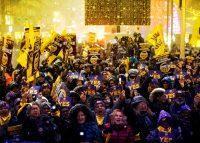If Bronx building workers make good on their threat to strike in the event contract negotiations fail, landlords say the 2019 rent law is to blame.
This month, 32BJ SEIU, the union representing Bronx superintendents, porters, handypersons and doorpersons, clashed with the Bronx Realty Advisory Board over proposed changes to a 2019 contract set to expire Tuesday at midnight.
The union demanded fair wage increases and claimed BRAB at multiple bargaining sessions had sought to cut workers, such as superintendents, from the contract, and reduce healthcare benefits, while offering no reduction in labor hours.
Last week, the group authorized a strike, if necessary, to add leverage to negotiations.
But BRAB President Billy Schur said owners, squeezed by rising inflation, mounting arrears and the revenue constraints of the rent law, can’t afford the pay bump 32BJ floated.
Schur said the union asked for an annual average increase in wages and benefits of 4.11 percent, far above the 3.57 percent increase agreed upon two contracts back or the 3.59 increase greenlit by the now expiring contract.
“I’m at a loss to understand why they think that would be a reasonable ask,” Schur said. “It’s not realistic based on the circumstances.”
Three quarters of BRAB members own rent-stabilized buildings, Schur said, meaning, since the rent law passed nearly four years ago, those landlords have been unable to raise rents beyond the limits set by the Rent Guidelines Board annually.
Since 2019, the rent board has raised rents 6.5 percent. By contrast, inflation has pushed prices nearly 18 percent higher during the same period.
Owners claim everything from maintenance to utilities to insurance has soared.
And since Covid hit, owners have been forced to shoulder tenants’ arrears after a $2.8 billion federal infusion failed to cover the total need of New York state. Months after the rent relief portal closed there are still more than 100,000 applications pending.
On Monday, a BRAB spokesperson said the landlord group tried to nail down a pay bump that might work for both parties, offering to extend the current contract for six months, then tie a ’ wage increase to what the rent board approves in June.
As with rent increases for stabilized units, the wage raise would take effect in October.
“32BJ didn’t counter it, didn’t reject it, they just said you’re disrespecting us and we’re not going to entertain that possibility,” the spokesperson said.
Union executive Shirley Aldebol characterized the offer as a “six-month extension with zero wage increases and the potential for several years of wage freezes and benefits cuts.”
Since Monday’s bargaining flop, Schur said city and state elected officials, including Councilmember Rafael Salamanca and Assembly Speaker Carl Heastie, have called him to urge the landlord group to reach an agreement with the union.
“I reiterated to each of them what I have said throughout our negotiations: we want to work with the union in securing decent wages and benefits for their members,” Schur said.
“Hopefully, we can reach an agreement before [the deadline], but the union is making it increasingly difficult.” the BRAB president said.
Read more



